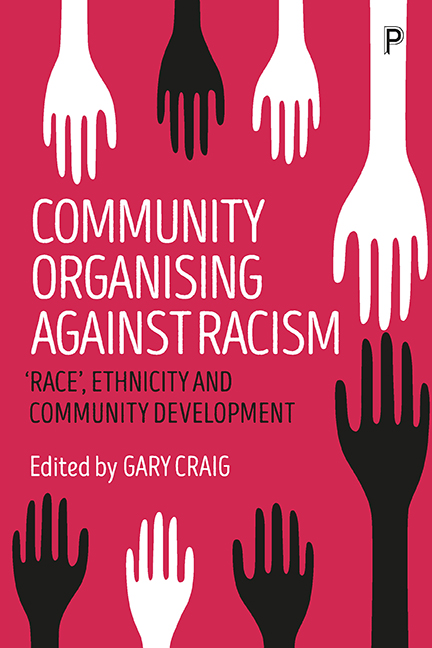Book contents
- Frontmatter
- Dedication
- Contents
- List of figures
- Author biographies
- List of abbreviations
- Introduction
- Section One Community development with ethnic minorities: history, theory, policy
- Section Two Building capacity with BME groups
- Section Three Working with Roma communities
- Section Four Global experience
- Section Five Working across cultural boundaries: ideological and personal reflections
- Afterword: Messages for community development in working with minority groups
- Index
Two - Critical youth and community work and its struggle with white standards
Published online by Cambridge University Press: 12 April 2022
- Frontmatter
- Dedication
- Contents
- List of figures
- Author biographies
- List of abbreviations
- Introduction
- Section One Community development with ethnic minorities: history, theory, policy
- Section Two Building capacity with BME groups
- Section Three Working with Roma communities
- Section Four Global experience
- Section Five Working across cultural boundaries: ideological and personal reflections
- Afterword: Messages for community development in working with minority groups
- Index
Summary
Where are we heading? How do we begin to dream ourselves out of this dark place of death and destruction and war, from this suffocating place where anyone who is not down with the war plan could be labelled a traitor? (Kelley, 2002, p 196)
Introduction
The ideas set out here emerged from a talk the author gave to the UK North East region regional Hate Crime Conference organised as a partnership between the North East Race Equality Forum (NEREF) and the Office of the Northumbria Police and Crime Commissioner (PCC) in late 2015. In that talk the environments of hostility encouraged by elements of the political establishment (Withnall, 2013; Syal, 2014) were identified as an important contextual reality in the everyday lives of BME young people in the city of Sunderland (Bowler, 2006; Saeed, 2007).
The chapter looks back on a 20-year developmental process to offer reflections on the place of ‘white standards’ (Lorenz, 1996, p 174) impacting upon a small intercultural youth work project. I argue that the white standards underpinning dominant cultural practices have been a core component perpetuating racialised hostile environments since the British state's whitewashing of national citizenship in the 1950s (Paul, 1997). It has been argued that whiteness is performed, yet appears to operate imperceptibly to those who embody it (Ahmed, 2004). This performance of whiteness is illuminated in the current moment where dominant establishment claims of a post-racial society (Nayak, 2006) are juxtaposed against rising forms of xeno-racism (Fekete, 2001), articulated through a focus upon anti-asylum, anti-immigrant and anti-Muslim activity. The resurgence of white authoritarian nationalism has accompanied a rise in racist violence, particularly in dominant monocultural white geographies across the UK (Burnett, 2013). This violence has been further accentuated by the 2016 decision of the UK to leave the EU and the neofascist comments made by prominent ‘Brexiteers’.
The chapter counters the dominant idea that Britain is post-racial. The counter-story illuminates attempts by BME and white youth workers to work with BME and white young people to encourage intercultural relationships in predominantly white spaces. The author explores the changes and continuities in the British state's relationship to its own formations of racism.
- Type
- Chapter
- Information
- Community Organising against Racism'Race', Ethnicity and Community Development, pp. 41 - 60Publisher: Bristol University PressPrint publication year: 2017



